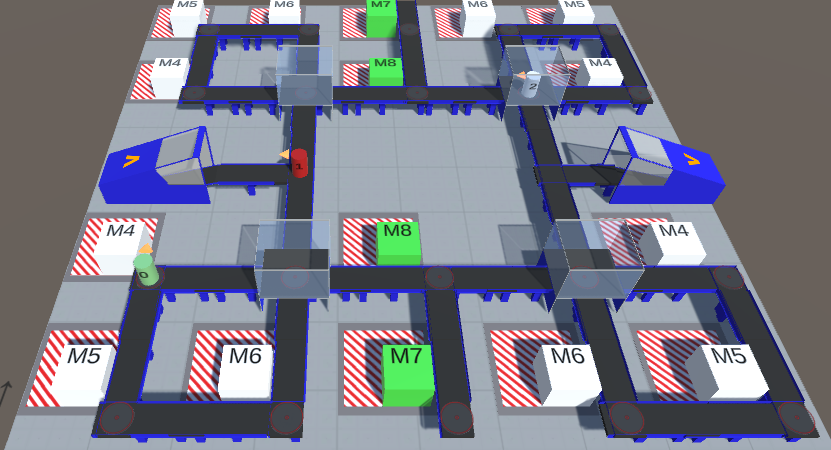Adversarial learning has been established as a successful paradigm in reinforcement learning. We propose a hybrid adversarial learner where a reinforcement learning agent tries to solve a problem while an evolutionary algorithm tries to find problem instances that are hard to solve for the current expertise of the agent, causing the intelligent agent to co-evolve with a set of test instances or scenarios. We apply this setup, called scenario co-evolution, to a simulated smart factory problem that combines task scheduling with navigation of a grid world. We show that the so trained agent outperforms conventional reinforcement learning. We also show that the scenarios evolved this way can provide useful test cases for the evaluation of any (however trained) agent.
@inproceedings{ gaborGECCO19,
author = "Thomas Gabor and Andreas Sedlmeier and Marie Kiermeier and Thomy Phan and Marcel Henrich and Monika Pichlmair and Bernhard Kempter and Cornel Klein and Horst Sauer and Reiner Schmid and Jan Wieghardt",
title = "Scenario Co-Evolution for Reinforcement Learning on a Grid World Smart Factory Domain",
year = "2019",
abstract = "Adversarial learning has been established as a successful paradigm in reinforcement learning. We propose a hybrid adversarial learner where a reinforcement learning agent tries to solve a problem while an evolutionary algorithm tries to find problem instances that are hard to solve for the current expertise of the agent, causing the intelligent agent to co-evolve with a set of test instances or scenarios. We apply this setup, called scenario co-evolution, to a simulated smart factory problem that combines task scheduling with navigation of a grid world. We show that the so trained agent outperforms conventional reinforcement learning. We also show that the scenarios evolved this way can provide useful test cases for the evaluation of any (however trained) agent.",
url = "https://thomyphan.github.io/files/2019-gecco.pdf",
eprint = "https://thomyphan.github.io/files/2019-gecco.pdf",
location = "Prague, Czech Republic",
publisher = "Association for Computing Machinery",
booktitle = "Proceedings of the Genetic and Evolutionary Computation Conference",
pages = "898--906",
keywords = "coevolution, evolutionary algorithms, adversarial learning, reinforcement learning, automatic test generation",
doi = "https://doi.org/10.1145/3321707.3321831"
}
Related Articles
- T. Phan et al., “Spatially Grouped Curriculum Learning for Multi-Agent Path Finding”, AAAI 2026
- T. Phan et al., “Generative Curricula for Multi-Agent Path Finding via Unsupervised and Reinforcement Learning”, JAIR 2025
- P. Altmann et al., “Challenges for Reinforcement Learning in Quantum Computing”, QCE 2024
- T. Phan et al., “Resilient Multi-Agent Reinforcement Learning with Adversarial Value Decomposition”, AAAI 2021
- T. Phan et al., “Learning and Testing Resilience in Cooperative Multi-Agent Systems”, AAMAS 2020
- T. Gabor et al., “The Scenario Coevolution Paradigm: Adaptive Quality Assurance for Adaptive Systems”, STTT 2020
Relevant Research Areas

